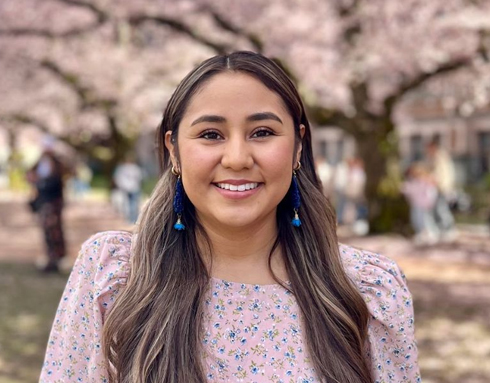From the Fields to Public Health: Miriam G. Flores Moreno Discusses How Precarious Employment Affects Agricultural Workers

Miriam G. Flores Moreno understands the demands of hard labor. Growing up in a rural agricultural town, she witnessed firsthand the toll farm work takes on families like hers. Now a doctoral candidate in the University of Washington Department of Epidemiology and a fellow in the Latino Center for Health (LCH) Graduate Student Fellowship, Miriam’s research focuses on precarious employment of Latine farmworkers and its impact on chronic disease and health disparities.
Farmworkers play an essential role in U.S. agriculture and food production. However, they also face numerous job-related conditions that can adversely affect their health, including unstable employment, long hours, lack of access to healthcare and benefits, high temperatures, insufficient shade, and exposure to pesticides. When she was younger, Miriam spent two summers doing agricultural work alongside other farmworkers and now considers the influence of those two summers on her work in public health. “It was an eye-opening experience to see the difficult working conditions that farmworkers face. It was a huge realization. I thought: ‘Wow. I’m just here temporarily for a summer or two, but these folks have been working in these conditions their whole life.’ I could see the dimensions of precarious employment within farm work.”
Miriam’s research examines how farmworkers’ working experiences contribute to long-term health issues, specifically exploring the relationship between long-term precarious employment and chronic disease. Farmworkers play an active role in her research and Miriam emphasizes that their voices are central. “When we talk with workers, sometimes they feel like they have no power. They know their health is being impacted, but they can’t do much about it. So just reminding farm workers that they have power. They have communities, opportunities, and resources to advocate for their well-being. We as researchers are there to back them up.”
The Latino Center for Health Graduate Student Fellowship provides not only financial assistance but also interdisciplinary support for students in health sciences. Through the program, Miriam has connected with students in dental school, pharmacy, social work, and public health from universities across Washington State, all working toward a common goal: improving healthcare access and enhancing the well-being of Latino communities.
“My work on precarious employment among Latine farmworkers will be transferable to understanding precarious employment as a whole,” Miriam says, highlighting the broader significance of her research. Focused on rural areas in Washington State, where healthcare access is limited, her work has the potential to address gaps in care and improve health outcomes for these communities. While many workers in the United States experience precarious employment—marked by instability, insecurity, and low wages with minimal benefits or protections—there is no legal definition for the term in U.S. labor law. Miriam’s research could help establish that definition, laying the groundwork for stronger protections for agricultural workers and others in similarly unstable employment.
Later in the year, fellows will have the opportunity to volunteer across Washington State, which Miriam sees as a chance to hear directly from communities. “My work is very focused on community-based participatory research,” Miriam says. “So even though we may know the issue from the research side, it’s good to hear the issue from the community’s perspective, to get a better understanding of how we can support them.”
In a time of uncertainty for the critical infrastructure that farmworkers provide in the food and agricultural sector, Miriam finds strength in the fellowship community, which reinforces the significance of her work. “I hope that my work gives light to the difficult experiences that farmworkers face on the job and how these experiences impact their life and well-being. This fellowship was a huge realization for me that the work that I’m doing is significant and that there are people who believe in the power of it.”